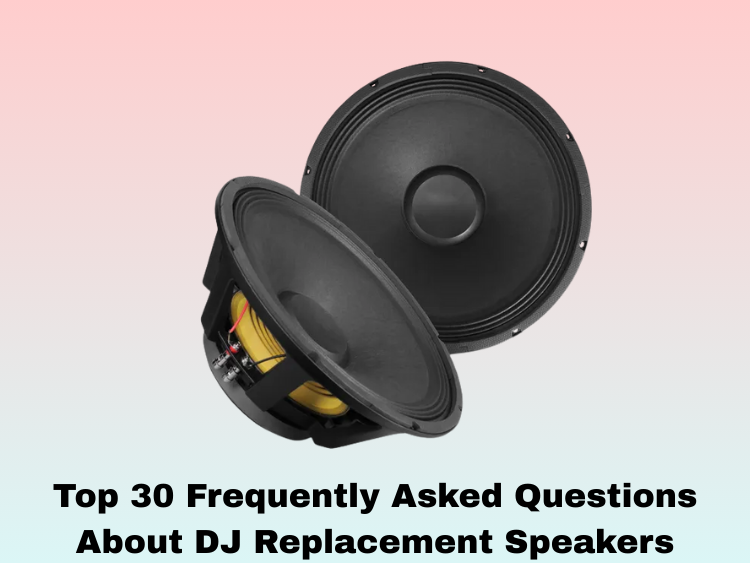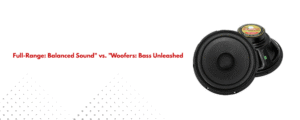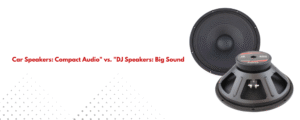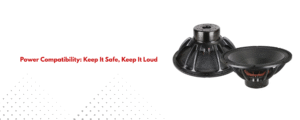No matter how experienced you are as a DJ or how new you are to live sound, your gear is important. Your speakers are especially important. Speakers can break down, wear out, or just stop working as well as they used to. This is where replacement speakers come in handy. You can use this guide to make smart, good choices by reading people’s 30 most common questions about DJ replacement speakers.
1. What is a stereo speaker for a DJ?
If a speaker in your DJ system, PA cabinet, or powered speaker box is broken, worn out, or not working right, you can use a DJ replacement speaker to fix it. It fixes your setup’s sound quality or even makes it better.
2. How often should I get a new DJ speaker?
If your current speaker starts to distort, stops making sound, has physical damage like a torn cone or burned voice coil, or just doesn’t have the output and clarity you need for your gigs, you might want to get a new one.
3. Do replacement speakers only work with certain names or models?
Others are general and can fit a variety of speaker cabinets as long as the size, voltage, and power levels are the same. Some aftermarket speakers are made to be straight OEM replacements for certain brands or cabinets.
4. How do I figure out what size speaker I need to buy?
Find out how wide your present speaker is by going from one edge to the other. 8”, 10”, 12”, and 15” are all common sizes. Always make sure of the size before you buy.
5. What is speaker resistance, and why is it important?
Impedance, which is measured in ohms (Ω), is the electrical resistance of the speaker. 4 or 8-ohm speakers are used in most DJ sets. It is very important to match the resistance to your amplifier to avoid damage and get the best performance.
6. How much power should the replacement speaker I buy have?
Choose a speaker that matches or exceeds your amplifier’s RMS power handling for safe and optimal performance. Peak power is the most power the speaker can handle in short bursts, while RMS is the amount of power it can handle continuously.
7. What’s the difference between inactive and active speakers?
Active replacement speakers have an amplifier built right in. Some don’t have this feature, and they need to be driven by an outside speaker. Most replacement speakers are inactive drivers that are meant to fix cabinet parts that have broken.
8. Can I get a better speaker than the one that came with it?
Of course. Many DJs switch to better drivers to get better sound quality, bass response, or total power handling. Ensure it fits your box and meets the power handling and resistance specs.
9. Can I just plug in the replacement speakers for my DJ?
In most cases, yes. Most only need simple connections. However, installing some powered cabinets or more complex systems might require technical know-how, like being able to connect or tune crossovers.
10. What tools do I need to change the speakers?
A screwdriver, wire cutters or strippers, and, if you want, a soldering iron if you don’t want to use ends and instead connect your speaker wires.
11. Can I just change the speaker cone instead of the whole thing?
That is what is meant by the word “reconing.” But it’s harder to do, takes longer, and usually costs more than changing the whole driver. Most of the time, this is done to old or expensive speakers.
12. How long does it take to put in a replacement speaker?
It takes about 15 to 30 minutes for most installations. You just take out the broken speaker, unplug it, plug in the new one, and then screw the old one back in.
13. What’s the difference between a full-range replacement speaker and a woofer?
A woofer’s main job is to handle low frequencies. A full-range speaker, on the other hand, can handle a wider range of frequencies, including some highs and mids. Pick a speaker based on what it does for your device.
14. Can I use speakers from more than one brand together?
Yes, but try to keep the values for resistance and sensitivity the same. If your speakers don’t match, the sound quality or volume may not be the same across your whole setup.
15. What is the sensitivity of a speaker?
Sensitivity tells you how loud a speaker will be at a certain power level. A higher sensitivity number (in dB) means that the sound is louder while using less power.
16. Will getting a replacement speaker make the sound better?
If your current speaker is broken, old, or not very good, getting a new one with a better driver can make the sound clearer, deeper, and louder overall.
17. What part does the body of the speaker play in the sound quality?
Resonance, tone, and effectiveness are all affected by the container. It’s best to make sure that the replacement speaker fits the type of cabinet (sealed, ported, etc.).
18. Can I use speakers from my car instead of DJ speakers?
Car speakers are made to work in various settings and with varying amounts of power. The speakers for DJs and PAs are made to be loud and used in open spaces.
19. What can I do to see if the speaker needs to be replaced?
Look for damage to the speaker and play test music through it. Listen for distortion or noise. A voltmeter can also be used to check continuity and resistance.
20. How can I keep my replacement speaker from blowing up?
Make sure you use an amplifier with the right rating, don’t turn up the noise too high, and make sure your system has enough air flow and is safe from overload.
21. Is it true that neodymium speakers are better for DJs?
Speakers with neodymium magnets are lighter and are often found in high-end portable units. They’re great for mobile DJs who want to move them around easily without losing sound quality.
22. Does the replacement speaker come with a warranty?
Yes, most well-known brands do offer guarantees that last between 6 months and a few years. Before you buy, always check.
23. What are the best types of speakers for DJs?
The best types of speakers for DJs are those with high power handling, clarity, and durability. Popular brands include JBL, 5 Core, Eminence, and Celestion, which offer reliable mobile and live performance options.
24. Is a replacement speaker the same thing as a subwoofer?
No. Under 100 Hz, a subwoofer is a type of driver that is designed to play deep bass. Depending on how your cabinet is set up, replacement speakers may have woofers, mids, or full-range drivers.
25. What kind of speaker works best with a floor monitor?
For DJ floor monitors, the best speakers are full-range ones with a widespread and clear voice. Make sure the alternative fits your wedge cabinet and can handle the power it needs.
26. How do I make sure that a crossover works with my replacement speaker?
Make sure that the crossover frequency is in line with the sound range that your speaker can handle. If you don’t have a low-pass filter, don’t send high sounds to a speaker.
27. Will a fix that doesn’t fit right affect the sound quality?
Yes, power, resistance, or sensitivity that don’t match up can lead to bad sound, less output, or even speaker failure.
28. Can I put a driver from a home speaker in my DJ cabinet?
Not often, no. DJ speakers are made to handle rough use and high SPL (sound pressure level). Home speaker drivers won’t work well in places where live music is played.
29. Should I get new ones if only one speaker is broken?
For audio systems, changing both makes sure that the sound quality and mix of the tones stay the same. If you’re only going to replace one, make sure it looks a lot like the old one.
30. Where can I find good replacement speakers for my DJ?
You can find high-quality replacement speakers for your DJ setup at trusted professional audio stores like JBL, 5 Core, Eminence, and Celestion.
Conclusion
DJ replacement speakers aren’t just about fixing broken gear—they’re about enhancing your entire performance. Whether you’re upgrading for sound quality or replacing a damaged driver, understanding specs like size, impedance, and power handling ensures you choose the right fit. A quality replacement speaker can make a noticeable difference on stage or in the studio.







